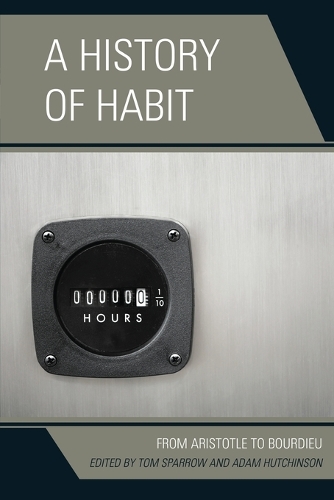
A History of Habit: From Aristotle to Bourdieu
(Paperback)
Available Formats
Publishing Details
A History of Habit: From Aristotle to Bourdieu
By (Author) Tom Sparrow
Edited by Adam Hutchinson
Contributions by Jeffrey Bell
Contributions by Nick Crossley
Contributions by William O. Stephens
Contributions by Shannon Sullivan
Contributions by David Leary
Contributions by Margaret Watkins
Contributions by Robert Miner
Contributions by Thornton Lockwood
Bloomsbury Publishing PLC
Lexington Books
26th February 2015
United States
Classifications
Professional and Scholarly
Non Fiction
185
Physical Properties
Paperback
328
Width 154mm, Height 228mm, Spine 25mm
490g
Description
From bookshelves overflowing with self-help books to scholarly treatises on neurobiology to late-night infomercials that promise to make you happier, healthier, and smarter with the acquisition of just a few simple practices, the discourse of habit is a staple of contemporary culture high and low. Discussion of habit, however, tends to neglect the most fundamental questions: What is habit Habits, we say, are hard to break. But what does it mean to break a habit Where and how do habits take root in us Do only humans acquire habits What accounts for the strength or weakness of a habit Are habits something possessed or something that possesses We spend a lot of time thinking about our habits, but rarely do we think deeply about the nature of habit itself. Aristotle and the ancient Greeks recognized the importance of habit for the constitution of character, while readers of David Hume or American pragmatists like C.S. Peirce, William James, and John Dewey know that habit is a central component in the conceptual framework of many key figures in the history of philosophy. Less familiar are the disparate discussions of habit found in the Roman Stoics, Thomas Aquinas, Michel de Montaigne, Ren Descartes, Gilles Deleuze, French phenomenology, and contemporary Anglo-American philosophies of embodiment, race, and gender, among many others. The essays gathered in this book demonstrate that the philosophy of habit is not confined to the work of just a handful of thinkers, but traverses the entire history of Western philosophy and continues to thrive in contemporary theory. A History of Habit: From Aristotle to Bourdieu is the first of its kind to document the richness and diversity of this history. It demonstrates the breadth, flexibility, and explanatory power of the concept of habit as well as its enduring significance. It makes the case for habits perennial attraction for philosophers, psychologists, and sociologists.
Reviews
The duality of habitthat which frees us and binds ushas fascinated philosophers for a long time. With historical breadth, interdisciplinary scope, and philosophical depthtackling habit from the Greeks to the present, bringing psychology and sociology together with philosophy, and probing issues from the metaphysical to the practicalthis is an excellent contribution to a perennially important topic. -- John Protevi, Louisiana State University
Habit really does have a history, as this book shows, but of course in disconcertingly chaotic lives such as ours, habitsare principles of continuity or consistency.Here, the contributions of a remarkable range of scholars from across traditions and disciplines elucidate the matter of habit in a manner itself both varied and continuous. -- Crispin Sartwell, Dickinson College
This volume is a welcomed addition to the recently revived interest in the significance of habit for understanding human actionan interest lost in much contemporary social science and philosophy. As this collection of papers amply attests, the concept of habit has a rich intellectual history full of explanatory power and contradictory evaluations from the classics to our modern period, from Aristotle to Bourdieu. This book challenges us to overcome the intellectual habit of neglecting the central place of habit in shaping human thought and action. -- David Swartz, Asbury University
Author Bio
Tom Sparrow teaches in the Department of Philosophy at Slippery Rock University, Pennsylvania, where he works primarily in continental and modern philosophy. He is the author of Levinas Unhinged and The End of Phenomenology: Metaphysics and the New Realism. Adam Hutchinson is a PhD candidate in philosophy at Duquesne University. His main areas of interest are American pragmatism, the history of materialism, and critical theory (especially questions of race).
